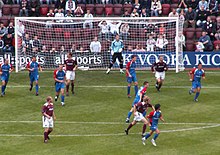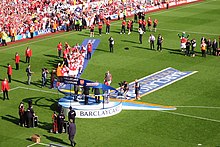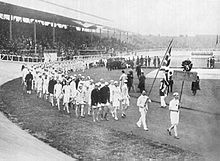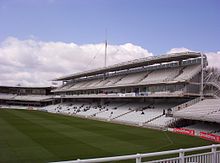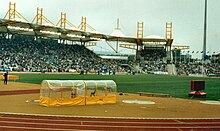Sports in the UK
Sport plays an important role in the UK . The most popular team sport is by far football . It is followed by cricket , rugby union and rugby league . Important individual sports are athletics , fencing , golf , motor sports and horse racing . The rulebook of many major sports developed in the United Kingdom. These include football, tennis , squash , golf, boxing , rugby , cricket, snooker , billiards , badminton , curling , polo .
organization structure
The four states of England , Scotland , Wales and Northern Ireland have separate teams in most team sports. However, only joint teams from all four Home Nations are sent to the Olympic Games . These start formally under the name "Great Britain and Northern Ireland", which is usually shortened to "Great Britain". Competitions between the four states once formed the backbone of British sport, but they have lost much of their importance in recent decades. For example, the British Home Championship in football has not been held since 1984. Club championships are also held separately in most team sports; "British" championships are therefore very rare.
The importance of national teams and club competitions differs from sport to sport. In football, the club competitions are clearly in the foreground, as the teams play games throughout most of the year. However, this does not have a negative impact on the national team's games, as these are also very popular. In cricket, the national teams enjoy far more attention than the games of the club teams, while in rugby league it is the other way around. In rugby union the ratio is roughly balanced.
In individual sports, the distinction between the four home nations is of little importance and the athletes are generally considered to represent the whole of the United Kingdom; however, Scottish sports enthusiasts, for example, identify more with a Scottish athlete than with an athlete from any other state. In contrast to the Olympic Games, each “home nation” sends its own teams to the Commonwealth Games .
Social structure
In the individual sports, there are sometimes clear regional and social differences. In large parts of the English and Scottish lower social classes (working class) , football is by far the most popular team sport, whereas in Wales and the middle and higher social classes (upper class) of England and Scotland's rugby union, rugby union is mostly the number one team sport. Cricket and polo are also traditionally more socially “elitist” sports, while rugby league is considered a working class sport in northern England.
These facts mostly have historical causes. In the English working-class neighborhoods of the big cities without lawns it was not possible to play rugby, but football only needed a backyard. The higher schools of the upper class all had grass pitches on which one could play rugby and cricket. Over time, the respective sport also became a way of identifying with its "class". Especially when you look at the stands of a rugby and football match, for example of the English national teams, you can see clear differences in the clientele today. Violence among and by fans has long been a huge problem in English football, but has never played a role in rugby.
Administration and financial support
The Department of Culture, Media and Sport is responsible for sport at the government level . The ministry is headed by a cabinet minister, but the minister for sports and tourism who reports to him is not a member of the cabinet. The British Olympic Association is responsible for the coordination of Olympic sports .
Most of the financial support for top sport in the UK comes from commercial proceeds, but this is limited to a few sports. According to Deloitte Touche Tohmatsu, the FA Premier League football teams achieved sales of 1.25 billion pounds in the 2003/04 season , and all British professional football teams together around 2 billion pounds. Other major sports generate sales between a few tens of millions and a few hundred million pounds. For example, television rights to cricket matches cost £ 55 million each year between 2006 and 2009.
Athletics, as well as most other sports that are outside the top 10 in terms of popularity, are heavily dependent on public support. The government agency that coordinates this is UK Sports , which has its own sub-agency in each state. They are responsible for distributing the money distributed by the National Lottery . Individual sports are financed separately. Tennis is financed from the profits of the Wimbledon Championships , horse racing with a fee on bets.
popularity
A survey carried out in March 2005 by the opinion research institute MORI on the most popular sports in the UK brought the following results:
| sport | TV viewers | Active participation |
|---|---|---|
| Soccer | 46% | 10% |
| Rugby union | 21% | k. A. |
| tennis | 18% | 3% |
| athletics | 18% | 2% |
| snooker | 17% | 5% |
| Cricket | 17% | 2% |
| Motorsport | 16% | k. A. |
| Rugby league | 12% | k. A. |
| Boxing | 11% | k. A. |
| golf | 11% | 6% |
| darts | 9% | 3% |
| swim | k. A. | 21% |
| do gymnastics | k. A. | 12% |
| badminton | k. A. | 3% |
| squash | k. A. | 3% |
| otherwise. water sports | k. A. | 2% |
| Alpine skiing | k. A. | 1 % |
Sports media
The British media landscape is dominated by national media, local media are of very little importance. Traditionally, the BBC played a dominant role in television broadcasts and provided extensive, high-quality, advertising-free coverage. She received broadcast rights at a low price. To a lesser extent, ITV also did sports coverage . These firmly established structures were shaken in the early 1990s with the introduction of pay TV . The marketing concept in the early years of BSkyB was mainly based on securing the transmission rights for the highest English football league and on offering a comprehensive program. As a result, BSkyB acquired the rights in other sports. However, BSkyB tends to focus on sports competitions that can regularly attract large numbers of viewers. In particular, sports events that take place only once a year or less often, such as B. the tennis tournament of Wimbledon or the Olympic Games can still be received free of charge. There are also regulations issued by the independent television commission that prevent individual sporting events from being broadcast exclusively by pay-TV channels.
The reports on the radio are also important. The broadcaster BBC Radio Five Live reports on almost all major sporting events. He has a commercial rival called talkSPORT who, however, has nowhere near as many exclusive contracts as BSkyB. BBC Local Radio focuses on regional events and coverage of minor league games. While there is not a single specialized sports newspaper, all national newspapers except the Financial Times have extensive sports coverage. There are also a variety of weekly or monthly sports magazines.
Top team sport
There are professional leagues of high importance in four sports. Football is the most popular sport and is played from August to May. Rugby Union is also played in the cooler season . In summer, more precisely from April to September, cricket and polo are played. Rugby League is traditionally a winter sport, but in the late 1990s league operations were moved to summer to reduce competition with football. There are also professional leagues in basketball and ice hockey , but these are more of a shadowy existence in the media. In the other sports there are semi-professional and amateur leagues.
Soccer
Modern football evolved from the traditional British football games of the 19th century. This sport is by far the most popular today. So popular that it is often seen as a threat to other sports. At the international level, the four British states compete separately, with a British national team only at the Summer Olympics . The very first international match took place between Scotland and England in 1872 . The only international title is England winning the 1966 World Cup in front of a home crowd.
Each state has its own football association; these are the Football Association (England), the Scottish Football Association (Scotland), the Football Association of Wales (Wales) and the Irish Football Association (Northern Ireland). You are responsible for the national teams, grassroots sports and cup competitions. Compared to the professional leagues, however, they have lost some of their influence. There are separate league systems in each of the four “home nations”.
The English league system includes thousands of clubs, topped by no less than four professional leagues. The highest is the FA Premier League with 20 teams. The three leagues below (League Championship, League 1, League 2) with a total of 72 teams are organized by the English Football League . Below the top four leagues there are a few professional teams and a large number of semi-professional teams. So England has more than a hundred professional teams, more than any other European country. The two most important English cup competitions are the FA Cup and the League Cup .
Scotland has a similar structure, but on a smaller scale. The main league is the Scottish Premier League (SPL) with twelve teams, which is clearly dominated by the Glasgow Rangers and Celtic Glasgow , both financially and in terms of number of fans. Below the SPL is the Scottish Football League with three leagues and a total of 30 clubs, but not all of them are fully professional. The two most important cup competitions are the Scottish Cup and the Scottish League Cup .
The highest league in Wales is the League of Wales . Their importance is relatively minor, however, since rugby union is the Welsh national sport and the three best Welsh teams are integrated in the English league system. The Welsh Cup and the FAW Premier Cup are the most important cup competitions. The top division in Northern Ireland is the Irish Football League with three classes, which despite its name is only open to Northern Irish teams, in contrast to the more permeable League of Ireland from the Republic of Ireland .
Cricket
Cricket was developed in England and is considered the English national summer sport. In terms of finance, audience numbers and coverage, cricket is nowhere near football, but the sport is nonetheless highly regarded. There are 18 professional county clubs, 17 in England and one in Wales. Every summer these teams compete in the County Championship , which consists of two leagues with eight and ten teams respectively and in which the games are played over four days (so-called first-class cricket ). The same teams also play in the Royal London One-Day Cup ( one-day cricket ) and the Twenty20 Cup . The teams are heavily dependent on subsidies from the England and Wales Cricket Board , which generates its income from television and advertising contracts, as well as from viewing income for international matches.
At the international level, Scotland , England (together with Wales) and Ireland (Northern Ireland and Republic of Ireland together) have their own teams. England and Ireland are recognized as test cricket nations and are therefore eligible to play for five-day internationals, while Scotland is an associate member of the International Cricket Council and only contests one-day internationals . Every summer two or three foreign teams visit England to play seven test matches and numerous one-day games. In winter it is the English team that is on the road abroad. The main rival is the Australian team , with whom the English play for The Ashes , one of the most famous trophies in British sport.
rugby
Like football, rugby union and rugby league evolved from traditional British ball games of the 19th century. The rules of rugby union were standardized in 1871. Rugby League came into being in 1895 when some clubs wanted to be able to pay their players and subsequently created slightly different rules. For most of the 20th century, there was great rivalry between the two variants of the game. Rugby League was considered a working class game and was deeply rooted in the industrialized regions of northern England, while rugby union is popular in all sub-states and tended to appeal to the middle class. That rivalry has diminished noticeably since 1995 after the International Rugby Board decided to open rugby union to professional players.
Rugby union
In Wales, rugby union is a national sport. The four "home nations" appear at the international level with separate teams, with Northern Ireland forming a joint team with the Republic of Ireland. All British national teams are among the ten best in the world. You take part in the most important European competition, the Six Nations (together with France and Italy). In addition, they regularly play against the Springboks (South Africa), the Wallabies (Australia), the All Blacks (New Zealand) and other national teams. The English national team won the World Cup in Australia in 2003 , which was the first time a team from the northern hemisphere became world champions.
The most important competition in England is the Guinness Premiership with twelve teams. The EDF Energy Cup , in which Welsh teams have also participated since 2005, is also important. Since the professionalization of sport, the average number of viewers has increased significantly. However, this development had a negative effect on the traditional structures in Scotland, Wales and Ireland, as the clubs there do not have the financial means to keep up with English and French teams. These three countries have therefore created joint structures at the top level in the form of the Celtic League. From the 2010/11 season, Italian teams were also integrated. There are currently four Welsh, three Irish, one Northern Irish, two Scottish and two Italian teams playing in the league, which has been called Pro12 since 2011 .
British clubs and provincial national teams also take part in the two European competitions, the Heineken Cup and the European Challenge Cup .
Rugby league
The association of rugby leagues for the whole of the United Kingdom is the Rugby Football League . In general, rugby league attracts fewer spectators than rugby union, but the heartland ( Yorkshire and north-west England ) is particularly popular; The sport is also popular with television viewers. The highest class club competition in England (and also Europe) is the Super League ; ten of the twelve teams come from the heartland, one from London and one from France. Below the Super League are the three National Leagues with ten teams each. The most important cup competition is the Challenge Cup , in which teams from France and Russia also take part.
Rugby League is also practiced as an amateur sport, particularly in the heart of the north of England, where the game is organized by the British Amateur Rugby League Association . Since the rugby union federations no longer discriminate against the Rugby League, the number of amateur players has increased significantly, especially outside the heartland.
At the international level only England have a serious national team, with the possible exception of Wales. The four “home nations” join forces in numerous tournaments and compete together as “Great Britain”. The British national team won the World Cup in 1954, 1960 and 1972. But it is precisely in this competition that England and Wales have been competing separately since then, with the result that Australia has been unbeaten since 1975. The British national team competes against Australia and New Zealand in the Tri-Nations competition that has existed since 1999 . In addition, she plays against Australia for the Ashes Rugby League and against New Zealand for the Baskerville Shield .
polo
Polo came to Great Britain through British Army personnel from India. From there the sport spread to Argentina , the USA and Australia . The British officer Edward Hartopp created the first polo rules in Europe and in 1872 the second polo club in Europe was founded in Monmouthshire . Today there are an estimated 2000 players in 55 clubs. Well-known polo tournaments like the Queen's Cup and the Gold Cup attract thousands of spectators. Great Britain has so far won three gold medals in polo at the Summer Olympics, two second and third places each in the world polo championship and five victories in the European polo championship. Great Britain's most famous players include Prince Charles and his sons Prince William and Prince Harry . English professional players Mark Tomlinson and Luke Tomlinson were the first European polo players to compete in the Argentine Open in Buenos Aires when they first competed there in 2005.
Other team sports
Basketball is a minor sport in the UK. As of the 2005/06 season, the British Basketball League is the highest league with eleven teams, including the English Basketball League with twelve teams. The teams are professional or semi-professional but have modest resources. The British national team has no international successes. Ice hockey is also of little importance, despite some great successes in the first half of the 20th century . The top league is the Elite Ice Hockey League . Hockey, on the other hand, enjoys a much higher level of attention, with the British men's team winning the gold medal at the 1988 Olympic Games. Since this success, however, the level of performance has fallen, especially due to the fragmentation of forces in four national teams at other international tournaments. Australian football is only played at an amateur level, especially by Australian immigrants who are very numerous in London. Curling is played almost exclusively in Scotland . The water polo game, also invented in the British Isles, is always quite widespread at universities and private schools, but the connection to the top of the world was lost before the Second World War .
Individual top sport
athletics
Over the whole year, athletics receives little attention, but interest increases many times over at major championships. The attention paid to successful British athletes can best be measured by the fact that the BBC Sports Personality of the Year elections do not consider other sports to be nearly as likely as track and field athletes. The association responsible for British athletics is UK Athletics (UKA). In addition, there are semi-independent sub-associations in each of the four sub-states.
For the past few decades, British athletes have typically won one to three gold medals at the Olympics. The men are traditionally successful, especially in the middle distance. But since the late 1980s there has also been increasing success in other disciplines and among women. The main annual athletics events are the London Marathon and the Great North Run , a half marathon between Newcastle upon Tyne and South Shields .
golf
Modern golf was developed in Scotland. In the early 20th century, the British golfers were the best in the world and won before the First World War, almost all US Open . American golfers have led the way ever since, but there have always been highly successful British golfers, especially in the 1980s and 1990s. The Open Championship is the oldest golf tournament in the world that is still played and the only major men's tournament outside of the United States. It takes place alternately on a number of UK golf courses, with a focus on Scotland. The most famous of these golf courses is St Andrews Links with the Old Course , also known as the "home of golf". The PGA European Tour is headquartered in the Wentworth Club, southwest of London, and no other country has more tournaments of this series than the United Kingdom. Most of the players on the European Ryder Cup team are British.
tennis
Tennis is another sport that originated in the UK. However, media attention is almost entirely limited to the Wimbledon Championships . No Briton has won this prestigious tournament since 1936, and no woman since 1977. The association of this sport is the Lawn Tennis Association , which invests most of the profits generated at Wimbledon in youth work in the hopes of producing a successful player. But the most successful players of the last few years like Greg Rusedski or Tim Henman did not even go through the association's support program.
The British men's team has won the Davis Cup ten times so far , nine pre-World War II wins and the tenth win against Belgium in 2015. The British women's tennis team reached the Fed Cup final four times but lost each time, most recently in 1981.
Motorsport
The United Kingdom is the undisputed center of Formula 1 . Most of the Formula 1 teams are based in England and more world titles have been won by British racing drivers than by drivers from other countries. The Great Britain Grand Prix takes place every July at the Silverstone Circuit , earlier alternating with the Aintree Circuit and Brands Hatch .
In addition to Formula 1, a number of other races take place, such as the British Formula 3 Championship , the British Touring Car Championship and numerous motorcycle races. Well-known race tracks besides Silverstone and Brands Hatch include Donington Park and Oulton Park . British drivers were successful several times in the World Rally Championship . The Wales Rally Great Britain is part of the world championship program .
In addition to automobile races, motorcycle races are also very popular. The kingdom is considered the motherland of motorcycle racing in general. The Tourist Trophy , which has been held on the Isle of Man on public roads since 1907 , is one of the most famous and difficult motorcycle races in the world. Before the Second World War, British riders and manufacturers dominated the European motorcycle championship . After that, the British, especially in the 1950s and 1960s, were also very successful in the motorcycle world championship .
For the Grand Prix of Great Britain for motorcycles , the British rounds of the Superbike World Championship and the many national road and track races flowing hundreds of thousands of visitors annually.
The national British Superbike Championship is considered one of the best Superbike championships in the world.
Speedwaysport with its professional league is also popular. British speedway drivers Tommy Price , Freddie Williams , Peter Craven , Peter Collins (track athletes) , Michael Andrew Lee , Gary Havelock , Mark Loram and Tai Woffind brought Britain ten gold medals in the individual speedway world championships. Simon Wigg and Kelvin Tatum have also won the World Long Track Championships eight times.
Boxing
The United Kingdom was also a leader in the development of modern boxing , especially with the Queensberry Rules established in 1867 , the main features of which are still in force today. In British boxing matches, most of the money can usually be made outside of the US. Heavyweight boxers are particularly well known, but most of the British world champions competed in the middle weight classes. Professional boxing is the responsibility of the British Boxing Board of Control (BBBofC), while amateur boxing falls under the responsibility of the Amateur Boxing Association of England (ABA) or its sister organizations in the other three states. Amateur boxing has a low level of attention today, as many boxers switch to professionals at a young age. The national championships and international team competitions for amateurs, which were once among the highlights of the British sporting year, have now almost sunk into insignificance.
rowing
Rowing is a popular and established sport in the UK. It is mostly associated with prestigious boarding schools and the universities of Oxford and Cambridge . The most famous British rowing events are the Boat Race and the Henley Royal Regatta , both held on the Thames . The Dorney Lake regatta course is owned by Eton College . In recent years, rowing has become a popular sport due to British successes at World Championships and Olympic Games, particularly those of Steven Redgrave and Matthew Pinsent .
swim
The three swimming federations of England, Scotland and Wales are brought together by the umbrella organization British Swimming . The UK sends large teams to all major international events and has had some success, but the country is currently not one of the leading swimming nations. Respect for sport is highest during the Commonwealth Games and the Olympic Games. Compared to other European countries, the number of 50-meter swimming pools is small. In 2005 there were only 13 of these, and another ten were in the planning stage. However, 25-meter pools are much more common. Swimming is also a popular pastime that more than a fifth of all residents do.
Equestrian sport
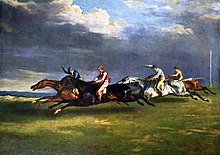
Horse races occupy a prominent place in British sports and are one of the most covered events in the media. There are 60 racetracks in the UK and two in Northern Ireland, which attract around six million visitors a year. The sport is organized by the Jockey Club and the British Horseracing Board . The National Hunt obstacle races usually take place in winter, and flat races in summer. But the seasons are long and overlap. The three most important flat races are summarized in the Triple Crown ; these are the Two Thousand Guineas , the Epsom Derby and the St. Leger Stakes . Other important flat races include the One Thousand Guineas , the Epsom Oaks , the Royal Ascot , the Glorious Goodwood and the Ebor Festival . The highlights of the National Hunt season are the Cheltenham Festival and the Aintree Grand National .
The United Kingdom played a leading role in the development of eventing and show jumping . Two of the four annual three-day eventing competitions, which the FEI World Equestrian Federation counts as the highest category, take place here; these are the Badminton Horse Trials and the Burghley Horse Trials . The badminton competition has up to a quarter of a million spectators on the cross-country ride, making it the most popular paid sports event in the country.
Other individual sports
One of the most popular sports among the British is snooker and it is widely televised as they can offer a long and attractive program for a low price. The World Snooker Championship has been held at the Crucible Theater in Sheffield every year since 1977 . Other important tournaments are the UK Championship , the Masters and the Welsh Open . Darts is also very popular, also on television .
There are numerous other sports that British athletes are successful in. But they get far less attention, except maybe at the Olympics and the Commonwealth Games or when a Briton does something extraordinary like a new world record. These sports include road cycling , judo , gliding , modern pentathlon and sailing .
Olympic games
At the Olympic Games , the United Kingdom competes under the name "Great Britain". However, this is imprecise because it does not mention Northern Ireland. In the Eternal Medal Table , the country ranks sixth, but a disproportionately high number of medals were won at the beginning of the 20th century. After the Second World War, the British medal yield was generally perceived as rather disappointing. However, since 2000 there has been a marked increase again. Sports in which British athletes have been most successful are rowing , sailing , cycling, and track and field . London hosted the 1908 and 1948 Summer Olympics. In 2012, London will be the first city to host the city for the third time. Winter sports only play a minor role due to the climatic conditions. However, there have already been some successes in figure skating , curling and bobsleigh .
Disabled sports
The United Kingdom has played an important role in the development of disabled sports. The Paralympic Games had their origins in the Stoke Mandeville Games , which were held in 1948 at Stoke Mandeville Hospital in Buckinghamshire . The British team performed significantly better in the medal table at the Paralympic Games than at the Olympic Games. It was never worse than ranked fifth. The regular reporting and active promotion of the BBC contributes much to the popularity of disabled sports .
Student sports
Apart from some events at Oxford and Cambridge Universities , student sport has a very low profile in the UK. Universities usually have well-developed sports facilities, but there is no system of sports scholarships. The Loughborough University is regarded as the one university that most cares about the sport. Prospective professional players in the working-class team sports soccer and rugby league generally do not attend universities. This is more likely to be the case with talented young people in the middle-class sports of cricket and rugby union, but their club coaches usually play a greater role in development than their university coaches.
School sports
Physical education is compulsory for all students aged 16 and under, but the effective time devoted to exercise is often small. It is regularly complained that state schools are doing too little to educate their students in a sporty and healthy lifestyle. Sports culture is more developed in private schools. Top athletes from almost all sports are disproportionately often graduates from such schools, with the exception of football, rugby league and athletics. In addition to the sports already mentioned, netball and rounders are particularly popular in the lower school classes , but are almost exclusively played by girls. However, in recent years there has been a trend towards girls playing sports that are traditionally considered male, especially football.
Major sports facilities
National stadiums
Several of the largest and best-equipped stadiums in the UK are designed for national teams only and are only available for club level matches in exceptional circumstances:
- Wembley Stadium in London : home of the English national football team . Opened in 1923, it was rebuilt. Capacity 90,000 spectators after reopening in 2007. It was also the main venue for the 1948 Summer Olympics .
- Twickenham Stadium in London: home of England's national rugby union team . Opened in 1909; Capacity 75,000 (will be increased to 82,000).
- Millennium Stadium in Cardiff : home of the Welsh rugby union team and the Wales national football team . Opening in 1999; Capacity 75,000 spectators. Has served as a replacement for major English football matches during the rebuilding of Wembley Stadium since 2001.
- Murrayfield Stadium in Edinburgh : home of the Scottish national rugby union team . Opening in 1925; Capacity: 67,500 spectators.
- Hampden Park in Glasgow : home of the Scottish national football team . Opened in 1903; Capacity: 52,000 spectators.
The National Stadium of Northern Ireland, Windsor Park in Belfast, opened in 1905, is significantly smaller with a capacity of 20,332 spectators. It is the only one that regularly hosts club matches.
Club football stadiums
In the vast majority of cases, the British football stadiums were built solely for this purpose, so that the spectators are close to the action. In the late 1980s, many clubs began to modernize or replace their stadiums; a trend that continues to this day. At the beginning of 2005 there were 30 stadiums in England with seats and a capacity of more than 25,000 spectators, as well as three in Scotland. The largest is the Old Trafford of Manchester United with a capacity of 76,000 spectators, followed by Celtic Park the club Celtic Glasgow with 60,832 spectators.
Cricket stadiums
English cricket stadiums tend to be smaller than those in other countries, particularly India and Australia . Nine stadiums offer space for more than 10,000 spectators. The largest are Lord's Cricket Ground and The Oval with 30,000 and 23,500 seats respectively (both in London). The Lord's is internationally known as the "home of cricket".
Rugby stadiums
Rugby Union - and Rugby League Sports Teams are less prosperous than football clubs in general. This is also reflected in the state of the stadiums. Some clubs have seating stadiums with 10,000 to 25,000 seats, while others have to be content with stadiums that have simple earth embankments and standing room. Several clubs (especially rugby union) rent football stadiums.
Golf courses
The UK has numerous world-class golf courses that can accommodate tens of thousands of spectators at major tournaments. Most of them are concentrated in Scotland. The most famous golf courses are the Old Course in St Andrews (most common venue for the Open Championships ) and The Belfry in Wishaw (most common venue for the Ryder Cup ). The Wentworth Club, south west of London, is the only golf course that hosts two PGA European Tour tournaments each season .
Athletics stadiums
Compared to other states, the number of athletics stadiums in the United Kingdom is very small. The main reason for this is that you don't want rugby and soccer fans to sit behind a running track. As a result, athletics stadiums have to be financed separately. However, this can almost only be done with public funds, which, however, are rather sparse. The largest built after the Second World War athletics stadium, for the Commonwealth Games 2002 built City of Manchester Stadium with 38,000 seats, was rebuilt by the end of this event into a pure football stadium. The largest stadium currently in existence is Don Valley Stadium in Sheffield with 25,000 seats. The largest facility in London is Crystal Palace with only 15,000 seats. It will be surpassed by the London Olympic Stadium , which will hold 80,000 spectators during the 2012 Summer Olympics , but will be reduced to 25,000 spectators thereafter.
Horse races
There are no less than 62 flat and steeplechase horse races across the UK . The most famous race is the Grand National at Aintree Racecourse near Liverpool . Other famous racecourses are the Newmarket Racecourse , the York Racecourse and Ascot Racecourse .
Sports halls
There are no indoor sports in the UK that can regularly attract five-digit numbers of viewers, which limits the construction of large gyms. Nevertheless, some halls with more than 10,000 seats have been built in recent years and more are being planned. These establishments generate their income mainly from pop concerts, but they occasionally host boxing matches and other sporting events. The largest hall is currently the MEN Arena in Manchester . But this will be surpassed by the Millennium Dome in London when it reopens in 2007. There are some specialized halls for ice hockey and basketball, but their capacity is limited.
Web links
Individual evidence
- ↑ MORI Sports Tracker 1996-2005 ( Memento of the original from September 27, 2007 in the Internet Archive ) Info: The archive link was inserted automatically and has not yet been checked. Please check the original and archive link according to the instructions and then remove this notice. (PDF)
